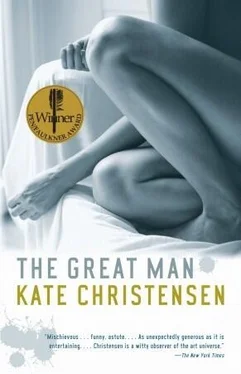“Because other autistics who aren’t as locked in have explained what it’s like, and they’ve described a whole world of sensation different from our own, but related. It’s not verbal. It’s not interpersonal. But it’s no less real for that.”
Ralph drank some wine, thinking about this.
“And,” Abigail continued, “I think it’s even more intense because there’s no shield of words in your head, no comfort of knowing everyone else feels what you feel. Language and society keep a lot at bay for us. Talking to ourselves and to one another. Autistic people have no such armor.”
The waiter returned, took away their empty first-course dishes, poured more wine into both their glasses, and then was gone.
“Why didn’t you have more children?” Ralph asked Abigail.
“Neither Oscar nor I wanted more children,” she said. “That is the short answer. I couldn’t take care of anyone else but Oscar and Ethan. They both needed me so completely and in such different ways, there was never any room for anyone else. And Oscar…well, he had more children, just not with me.”
“Right,” said Ralph, as if he weren’t sure how much he was supposed to ask or know about Oscar’s relationship with Teddy where Abigail was concerned. “And the long answer?”
“The long answer is a little more complicated,” she said. “No more children came along, although every now and then we would open ourselves to the possibility. With ambivalence on both sides, I have to add. So I think we were both relieved when it didn’t happen. Our parents thought we should try for more, though, so we did. Ethan wasn’t enough for them. They wanted a ‘normal’ grandchild. Especially Oscar’s parents, since Ethan was all they got. I have two sisters, and they had three children each, so my parents had plenty of normal grandchildren to look for the afikomen at the family seders.”
Ralph caught the eye of the waiter as he glided forth from the kitchen laden with plates. Abigail had a sudden image of Ralph and this beautiful young man entangling their limbs, white and black, in some imaginary realm of classical marble statues on a dappled Impressionist riverbank with the Italian Renaissance artists’ idea of Jerusalem in the background, those sheer, high, topographically unlikely mountains with their dizzying gorges and plunging waterfalls, strange black carrion birds wheeling high overhead.
“Everything all right?” asked the waiter.
“I haven’t had trout meunière in so long,” said Abigail. “This is terrific!”
The waiter fluttered doelike lashes and was gone.
“Oh!” Abigail exclaimed in a burst of wine-warmed chumminess. “Do you know what Teddy’s friend Lila said to me yesterday?”
“No,” said Ralph.
“She’s in love, but she can’t bring herself to tell Teddy — you know, Claire. Amazing that she told me, when she had only just met me. But I suppose that was safer. She said she’s afraid Teddy will resent her happiness or feel left out. And she’s seventy-four….”
“That’s something,” said Ralph with blank wonderment.
Abigail could tell that he couldn’t imagine being that old and feeling much of anything at all. Back when she was his age, old age had seemed as distant as a faraway time zone or planet. She had imagined the state of agedness as being like a Rembrandt self-portrait: the subject lit from within by a golden, ancient light, inscrutably wrinkled, at one with his achievements and beliefs, about to slide through the terrible black tunnel between this world and the next. The very idea of two people falling in sexual love at that fragile, faraway stage of life used to make her mind quail and shut down. The thought of old bodies conjoined, old faces mashed together, quavery voices making guttural sounds had seemed so undignified to her, it was obscene.
“This is a terrible time to be young,” she burst out.
“What do you mean?” Ralph asked.
“I love the computer; I spend as much time using it as anyone else. Maybe that’s why I’m saying this. I can see how much my life has changed. The feeling I get about what’s going on, which, I admit, is only from what I read, is that the young are highly sophisticated now, bright and educated and articulate, but no one is questioning the way things are in a massive, organized way. Kids’ lives are abstract, cerebral. There’s no cultural or political revolution, no upswell of anger. But there’s never been more to protest! Gosh, do I sound like an old crackpot.” She quoted in a high, self-righteous bleat, “‘When I was your age, I walked ten miles to school barefoot through the snow.’”
Ralph laughed. He held his wineglass up and looked off into the distance behind her left shoulder. “Things feel pretty hopeful to me,” he said. “Don’t worry about us.”
“I do worry about you,” she said, “and all of us.”
Ralph smiled at her. “Older people always worry about younger people.”
“And younger people always think they know what older people don’t know,” said Abigail, smiling also. “I have a business proposition for you.”
He looked startled. “You do?”
“Hypothetically,” said Abigail, “say I offered to stake you to graduate school. You could quit your job, study whatever you wanted. I have plenty of money, and nothing really to do with it all.”
“Why would you do that?”
“Because,” she said, “in return, you’re going to write a book praising Oscar without reservation. That other guy, Henry Burke, is probably going to try to stir up controversy and trouble. I want one biography of Oscar at least to be flattering.”
“I can’t!” he said, surprised.
“I knew you’d say that,” she said, “but just think about it. Oscar gave you so much, he inspired your career, and it’s the least you can do to repay him.”
“That may be,” he said. “But I don’t like feeling as if I’m being bought.”
“You’re not being bought ; you’re being paid extra to write the book you want to write. Just think about it; that’s all I ask.”
Ralph stared at Abigail for a while. The whites of his eyes were aggressively white and showed top and bottom between his eyelids and corneas, which made him look intense and intimidating. Abigail stared right back at him, silently urging him to acquiesce to her will.
“I’ll think about it,” he said.
The feeling of triumph this gave her — premature though it may have been — was like a snort of cocaine, not that she had ever actually tried cocaine, but she had read enough about it to know its biochemical simulacrum when she felt it.
“I can’t have breakfast this morning,” Lila was saying to Teddy in a tone of bashful apology.
It was Saturday morning, just half an hour before their standing breakfast date. It was Lila’s turn to come to Teddy’s; Teddy had just been slicing fruit. The hand that held the receiver was slightly sticky with plum juice even though she’d rinsed her hands quickly when the phone had rung.
“Are you feeling all right?” Teddy asked.
There was a brief silence on the other end of the phone. “Oh, yes.”
“Then why can’t you come?”
Another silence.
“Stop being coy! It’s that man, isn’t it?”
“His name is Rex,” said Lila, laughing a little. “Yes, he’s here right now.”
Teddy blinked in surprise. She hadn’t actually thought Rex was at Lila’s; she had only been teasing. For some reason, she had assumed that Lila’s not coming over today had had something to do with her grandchildren.
“At your house?”
“Right here,” said Lila. “Next to me.”
“You’re still in bed?” Teddy asked, choking slightly on some foreign emotion.
Читать дальше












